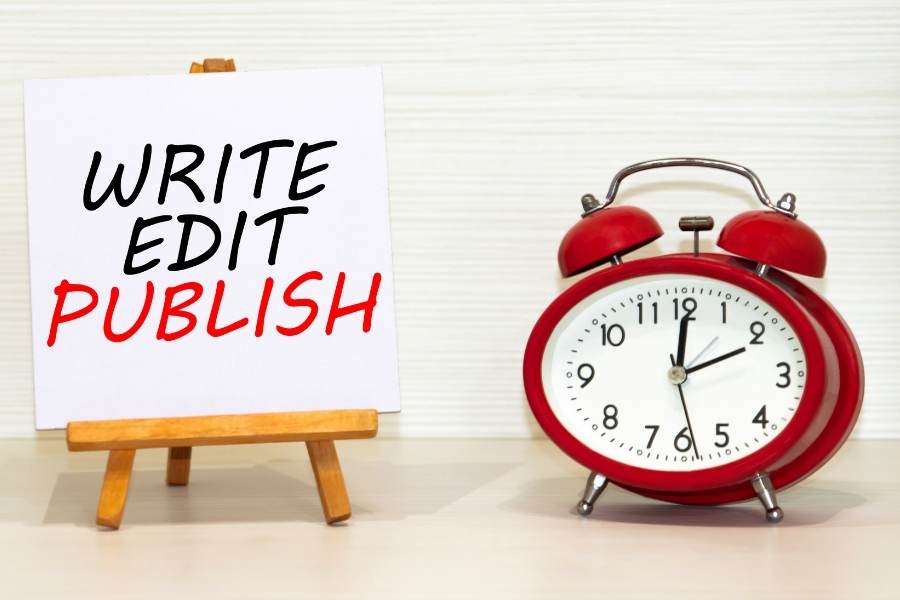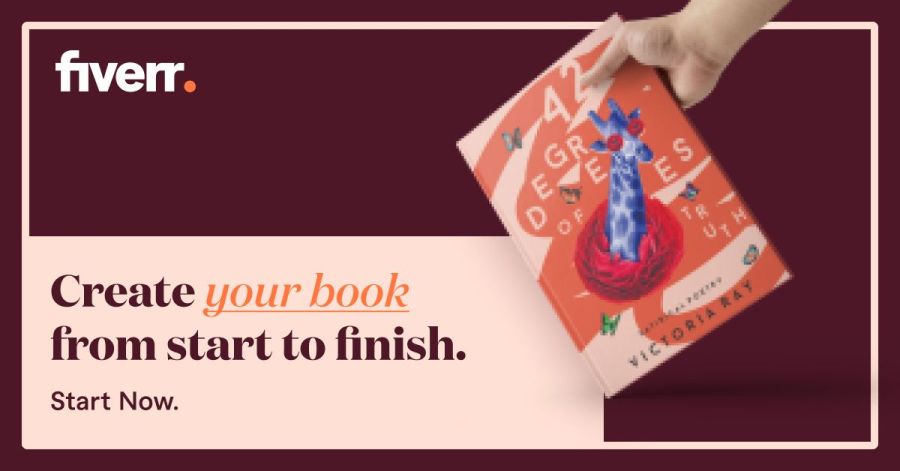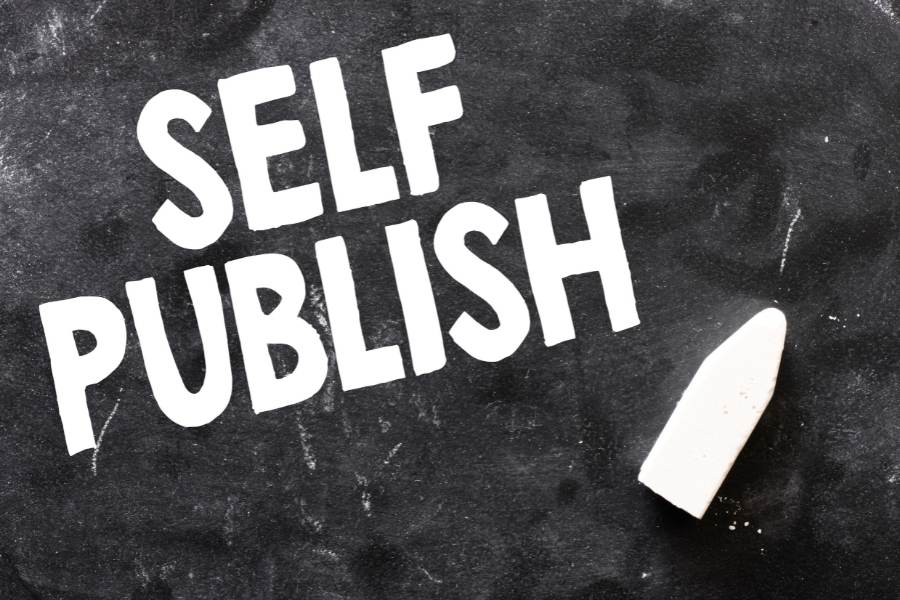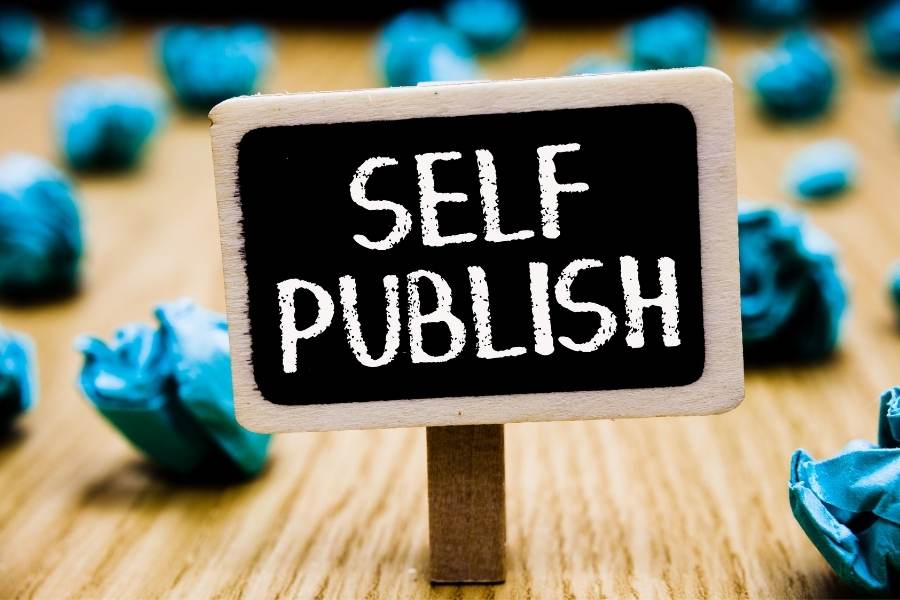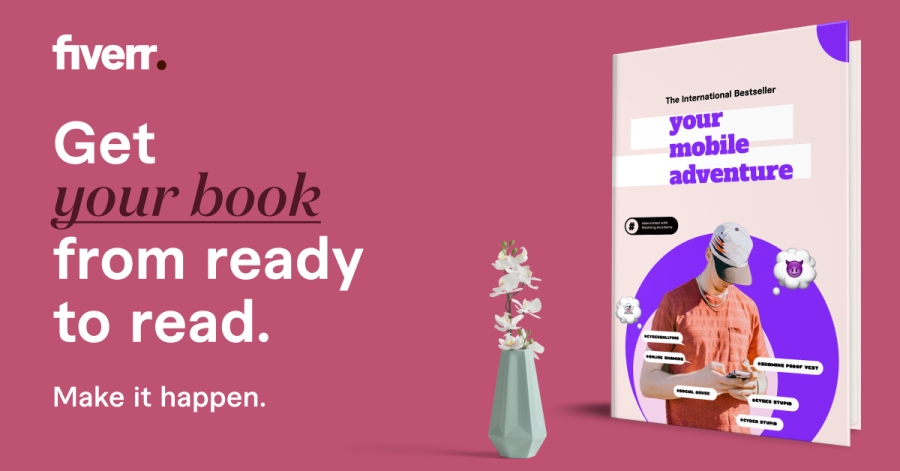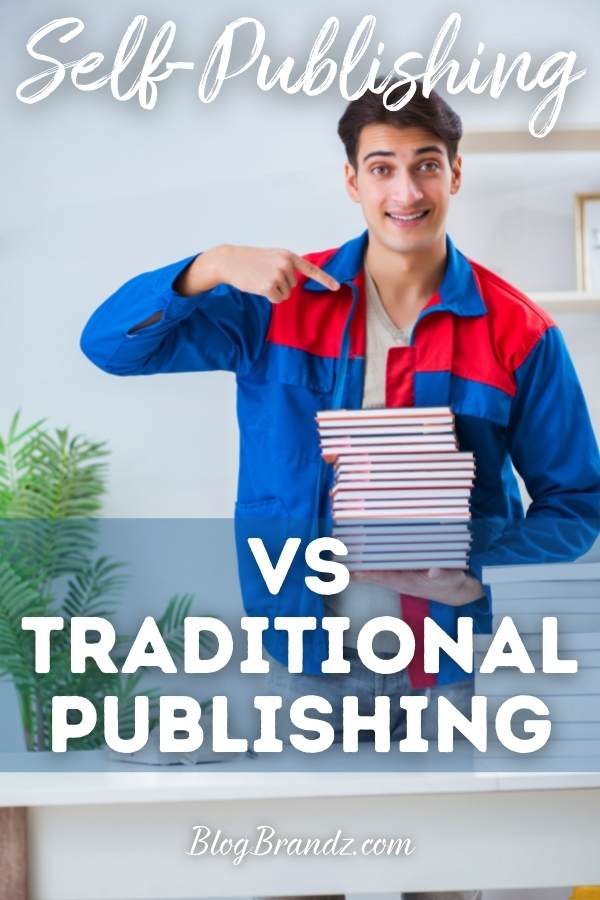
Dreaming of self-publishing a book? Learn the benefits of self-publishing vs. traditional publishing and how to go about becoming a self-published author.
Self-publishing a book is one of the publishing industry’s dirty little secrets. Mainstream publishers, editors, and authors easily dismiss self-publishing and print-on-demand publishing as a rip-off for both the writer and the reader.
After all, if the writer was a real writer then they could find a traditional publisher, right? That has been the conventional wisdom for a long time but in today’s modern, technological society that conventional wisdom does not always hold true.
Contents
What’s the difference between traditional publishing & self-publishing?
Traditional publishing and self-publishing through platforms like Kindle Direct Publishing (KDP) offer different paths for authors, each with its own set of advantages and challenges. Here are some key differences:
Control and Autonomy:
- Traditional Publishing: Authors often have less control over the publishing process. Publishers make decisions on aspects like cover design, title, and marketing strategy.
- Self-Publishing: Authors have full control over every aspect of their book, from cover design to pricing. They can make decisions independently.
Time to Market:
- Traditional Publishing: The traditional publishing process is usually longer, involving submission, acceptance, editing, and production. It can take 1-2 years or more before a book reaches the market.
- Self-Publishing: Self-publishing allows for quicker time to market. Authors can upload their book to platforms like KDP, and it can be available for purchase within days.
Royalties:
- Traditional Publishing: Authors receive a royalty percentage, typically ranging from 8% to 15% of the book’s net sales. Advances against royalties may be offered.
- Self-Publishing: Authors can earn higher royalties, often ranging from 35% to 70% of the book’s sales, depending on the platform and pricing choices.
Distribution:
- Traditional Publishing: Traditional publishers have established distribution networks, making it easier to get books into physical stores. They also handle international distribution.
- Self-Publishing: Distribution is primarily online, with a global reach through platforms like Amazon, Kobo, and others. Physical distribution to bookstores may be more challenging.
Marketing and Promotion:
- Traditional Publishing: Publishers generally provide marketing support, including book tours, promotional events, and advertising.
- Self-Publishing: Authors are responsible for their book’s marketing and promotion. While platforms may offer some tools, success often depends on the author’s efforts.
Upfront Costs:
- Traditional Publishing: Generally, there are no upfront costs for the author. Publishers cover editing, cover design, and other production expenses.
- Self-Publishing: Authors bear the upfront costs of editing, cover design, and other production expenses. However, self-publishing platforms often offer tools and services at various price points.
What’s the cost difference between self-publishing & traditional publishing?
The cost difference between self-publishing a novel and going through the traditional route of obtaining an agent and a publisher can vary significantly. Here are some general considerations for both options:
Self-publishing costs:
- Editing: You may need to hire professional editors for developmental editing, copyediting, and proofreading.
- Cover design: A well-designed cover is crucial for attracting readers.
- Formatting: You might need to pay for formatting services to ensure your book looks professional in various formats (eBook, print, etc.).
- Distribution: While some platforms allow you to self-publish for free, you might choose to use paid services for wider distribution.
- Marketing: You’ll likely need to invest in marketing and promotion to make your book visible to potential readers.
Traditional publishing costs:
- Agent fees: Literary agents typically work on a commission basis, earning a percentage (usually 15%) of the author’s advances and royalties. They don’t charge upfront fees.
- Editing: If a publisher accepts your manuscript, they will usually provide editorial services at no direct cost to you.
- Cover design, formatting, and distribution: These are typically covered by the publisher.
- Marketing: While publishers do contribute to marketing efforts, authors are often expected to participate and may need to invest in additional promotional activities.
It’s important to note that in traditional publishing, the author doesn’t bear the direct costs of production, but they earn royalties based on book sales. In contrast, self-published authors have more control over their work but are responsible for covering production and marketing expenses.
The cost difference can vary depending on the specific services and choices made in each case. Self-publishing may involve more upfront costs, while traditional publishing may require a longer time investment before earning significant income.
Additionally, the decision may also depend on factors such as the author’s goals, control over the creative process, and marketing preferences.
How can I choose the right publishing path for me?
Traditional Publishing might be a better fit if:
- You prefer to focus solely on writing, without getting involved in the business side of publishing.
- You are seeking the validation and prestige associated with traditional publishing.
- You are willing to be patient and go through a longer publishing process.
Self-publishing might be a better fit if:
- You want more control over your book and the publishing process.
- You are comfortable with marketing and promoting your work.
- You want quicker time to market and higher potential royalties.
Ultimately, the best choice depends on your goals, preferences, and the specific characteristics of your book. Some authors also explore hybrid approaches, combining elements of both traditional and self-publishing.
3 compelling reasons to consider self-publishing a book
There are many reasons why authors are choosing to self-publish instead of approaching a traditional publisher. Here are 3 of them:
#1. Self-publishing gives you freedom
So who should consider self-publishing? Real writers should consider self-publishing. Published authors often find themselves placed in a prison of their own making.
Once they have achieved even modest success in a specific niche it is often hard to break out of that niche and publish something different. However, self-publishing gives authors control over their own writing so they can change direction or genre if they want to.
Published authors who took some time off from their writing often find it just as hard to return as it was to break in initially. They can often easily parlay their experience and audience into a successful self-publishing career.
Finally, writers who have an idea that does not fit neatly into one of the major publishing houses’ slots may find self-publishing their only alternative. Just because it doesn’t fit into a neat slot doesn’t mean your book doesn’t have great potential — think about Diana Gabaldon and J.K. Rowling.
#2. Self-publishing gives you control over your material
If you’re a control freak, you should consider self-publishing your book. Once you sign your baby over to a major publisher then you lose control of your book. The publisher can slap a horrible or inappropriate cover on it, change its name, or even alter the main characters.
Your name will go on the book, but what is published may be very different from your original creation – and not always for the better. Think it won’t happen to you, or that you won’t care as long as you get the royalty check, then think again.
For many writers, being able to write without restrictions is a dream come true. Getting your message across is very important for a writer, especially those who need creative control, and it can be very difficult with a publisher and editor breathing down your neck.
#3. You can earn more if you self-publish your book
While self-publishing may require you to put up some of your own money and traditional publishing will instead offer you an upfront payment, the final balance sheet will tell you a much different story.
The initial advance from a traditional publisher will be small (unless you are Stephen King) and maybe the only money you receive for your book for a long time – and perhaps ever depending on how your book sells.
Any book royalties you receive will be for a small percentage and will be spread out over years to come as well as held ransom for book returns. The final indignity is that your book’s sales depend greatly on the promotional effort your publisher puts into it.
Why you should publish with Amazon KDP
The reason most writers cannot get their works published traditionally is that they did not fit the standards of traditional publishers. But, with Amazon self-publishing, you can publish almost anything.
When you publish a book on Kindle, you do not have to get a publisher’s approval and can publish anything you want on Amazon KDP as long as it meets all Amazon KDP guidelines.
Of course, this means that there are many crappy books published on Amazon Kindle too. But the ugly truth is that traditional publishers do not much care about your baby and will rarely put any extra money, manpower, or thought into how to promote your book.
Most mid-list and low-list authors conduct and foot the bill for, their own promotion. At least when you self-publish you know you will be on your own and you can factor that into your budget.
That’s why one of the best self-publishing companies for new or first-time authors is Amazon KDP Publishing. In fact, Amazon self-publishing is the best way for new authors to self-publish a book.
How to publish a high-quality book
The first process you must complete is writing the book itself. At the start of the writing process, you need to identify your target audience and write for them.
Once you’re done with your book and have got the manuscript edited and proofread by a professional editor, you can upload it using this self-publishing checklist for Amazon KDP publishing.
Just make sure that what you have to publish is something really good. To be an effective writer, you have to understand your audience and know how to connect with them at an emotional level.
For self-publishers who are more interested in creating an author brand with their books and not too concerned with book profits, it is still worth having a really good book on your hands.
You can even become a book writer and a published author without writing it yourself, such as by getting a ghostwriter to do it for you.
What obstacles do self-published authors face?
Self-publishing is not easy, especially if you aim to make a living as a self-published author. You need to think of your book as a product and yourself as a seller or book marketer.
As always, the road to success is not paved and full of challenges. There are common obstacles faced by authors who take a shot at self-publishing, the primary one being not having the money to promote your book
With traditional publishing, the publisher shoulders all the costs, and the author does not have to worry about it. But with self-publishing, the author shoulders all the expenses, and authors can never be sure if they’ll be able to get a good return on their investment.
How to go about self-publishing a book
While Amazon self-publishing is free and no-frills, it takes more than uploading a self-published book on Amazon for it to become successful. Here are the stages of self-publishing a book:
- Writing, editing, and providing illustrations if required
- Getting an attractive book cover designed
- Preparing the manuscript for publishing
- Marketing, distributing, and promoting the book
New authors have little idea of the cost of publishing a book and promoting it. Successful self-published authors understand that they need to invest in putting out a good product and promoting it to get a good return on their investment.
When self-publishing a book, you don’t want your self-published books to be seen as amateurish and of inferior quality. You need to hire editors and cover artists to polish your book. build an author platform, and run ad campaigns to promote your book.
Unlike Amazon self-publishing (which is free and no-frills) many self-publishing companies or vanity presses include additional book publishing and marketing services in their book publishing packages to give your self-published book an edge.
These may include:
- Copyrighting the book
- Editing and proofreading
- Getting an ISBN (International Standard Book Number)
- Getting an attractive book cover designed
- Creating promotional materials such as social media graphics
- Building your author website or landing page
- Creating a book promotion and book marketing strategy
- Getting expert book reviews before the launch
- Running an Amazon advertising campaign after the launch
- Helping your book become a bestseller on Amazon
Despite all these monetary considerations, if you have the determination, the confidence, and the drive, you shouldn’t let such obstacles prevent you from self-publishing a book. While it is good to be practical and realistic, you shouldn’t let anything or anyone hold you back from your dreams of becoming a self-published author.
If you want to get self-published on Amazon, these Amazon Kindle publishing tips will help you learn all about Amazon KDP publishing so you can join the ranks of the bestselling and successful self-published authors.
Book writing and marketing tips
- Free book writing software for beginners
- How to start writing a book for beginners
- 10 steps to write and publish a low-content book
- 7 questions on writing and publishing a book for beginners
- 7 tips for overcoming and dealing with writer’s block
- 7 habits of the most successful writers & famous authors
- How to write the perfect nonfiction book proposal that sells
- 5 tips for marketing self-published books that actually work
- How to become a book writer without writing a book yourself
- Learn creative writing with Masterclass creative writing courses
© 2021 – 2025, Priya Florence Shah. All rights reserved.
Priya Florence Shah is a bestselling author and an award-winning blogger. Check out her book on emotional self-care for women. Priya writes short stories and poetry and chills with her two-legged and four-legged kids in her spare time.
Discover more from Business & Branding Tips
Subscribe to get the latest posts sent to your email.
